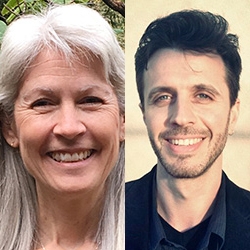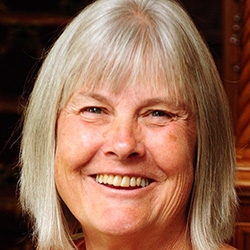

Search Results: collaboration
-
Trainer Tip: NVC-based social change naturally emerges from “a certain kind of spirituality”, a quality of spiritual clarity. Intuitions and impulses arising from spiritual clarity are more likely to support sustainable systems. Read on for how to bring more of this in, and ways to transform your complaint into commitment.
-
Even in a conflict, you can offer emotional safety without being enmeshed -- and you can do this without sliding into strategies to gain power over another. You can prioritize connection, express your intention, make space for mutuality, honestly reveal what you care about and propose a way forward. This means caring for your needs regardless of their response -- and mourning if their response isn't what you want. Read on for more.
-
- Wish you knew how to align your organization with its purpose and values?
- Want to increase your capacity to live in integrity with your values, too?
- Concerned about the level of engagement within your organization?
- Yearn to connect to a sense of meaning in your life during this time of global crises?
- Long to discover what is yours to do – and wish you knew how to leverage the resources you have in response to what is needed?
-
- Support family, community, and organizations to realign with life
- Get the building blocks of integrative decisions that work for all
- Learn to lean on all available capacities to dance together for liberation
- Reweave the threads of togetherness into something stronger than individual existence
-
In this book excerpt, Kathleen and Jared offer a path to reach deeper clarity, distinguishing between revealing ourselves and projection.
-
A chosen, interdependent world… In most cases, that's sure not the world we live in today, is it. But it could be the world we live in tomorrow. And you can choose to be part of bringing that better world to life – to be part of a gradual, joyful transformation – simply by using the dynamic, living power of Dialogue.
-
One of the key challenges of engaging in dialogue in the workplace is that – while we are all equally human – the norms of the workplace make honest and open dialogue challenging, especially when power differences are present. This course offers a plethora of considerations and tips designed to allow you to humanize your relationships at work, focus on your common goals, and bring more collaboration and goodwill to your team – and beyond.
-
In relationships, the desire for space can conflict with the need for intimacy. This conflict arises from different strategies to meet similar needs. By identifying specific needs behind the request for space and understanding the other person’s needs for closeness, both of you can negotiate and collaborate. Repeated conflicts may indicate the need for personal healing, which you’ll need to address individually.
-
- Understand the dynamics of power struggles
- Explore practical strategies for navigating power imbalances
- Discover ways you can share power in various relationships
- Explore how NVC supports a move away from domination, into shared power
-
- Hear from four respected NVC trainers offering heartfelt insights and real-life strategies
- Connect with others seeking compassion, courage, and meaningful action
- Attend as a gift — pay what you can to support NVC Academy
- Discover simple, practical tools to stay grounded, clear, and empowered—no matter what’s happening in the world!
-
If you’d like to bring more joy and fun into your workplace, listen to this trainer dialogue for NVC tips and tools from some of the leading experts in the industry.
-
- Learn concrete tools for engaging with others as you embrace individual and collective liberation
- Find your own source of choice even in the face of challenges
- Release the constriction of scarcity
- Find an empowered option to respond to what is happening in our world
- Open the door to the possibility of thriving rather than merely surviving
-
Prioritize connection before solutions by understanding each other's needs first.
-
- Gain a deeper understanding of trauma through the lens of NVC
- Learn how to connect with ALL needs, even when we’ve been taught to suppress some of them
- Grow capacity to creatively move towards our deepest longings interdependently
- Discover how you can call people back to life when they are in the thick of patterned behavior
-
In our internal conversations, some voices dominate others, which can leave us feeling fragmented or overwhelmed. But when we dive beneath the surface and really listen to our many parts, we connect vulnerably to our full humanity.
-
Even leaders we admire may exhibit behaviors that could be labeled as abusive, at least slightly. This includes not treating followers as equals, using charm, and hiding or twisting truth. In such scenarios a key reason for this is loneliness. If we're using our work and position primarily to gain for appreciation, acknowledgement, and acceptance then we need to examine our own loneliness. We need feedback to keep such conduct in check.
-
Our "felt-sense" can provide crucial information about our experience and our lives. It can also help us integrate and retain information. This can also bring greater access to internal resources, choice, open heartedness, collaboration and creative solutions. From there, profound insight and transformation can follow. Here's how we can harness that...
-
Differentiation is being who you are in the presence of who they are. Its a process of connecting to and honoring your own experience, acting in integrity with your values, and engaging in collaboration with others to meet needs. If you're happier when you are not in an intimate relationship you may have developed your individuality but likely have difficulty with differentiation. Learn core skills and behaviors that support differentiation.
-
If you want to support someone in distress offer a menu of ways you can contribute. Often a person in distress can’t articulate what they need but can recognize it when they hear it. Move fluidly among these 11 options to offer what’s truly helpful, rather than offering something out habit or based on what you think they should have. Remember that you can ask, “Is this helpful?” to support collaboration.
-
Join Dian Killian as she reframes the 4 steps of NVC (observations, feelings, needs, requests) into everyday words you might hear at work.

Quick Links
Subscription Preferences
Stay In Touch!
Looking for ways to keep up with NVC Academy news, get special offers, free resources, or words of inspiration? Here are five ways to stay engaged:




















